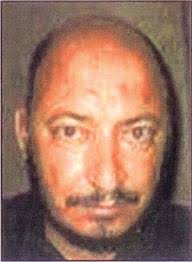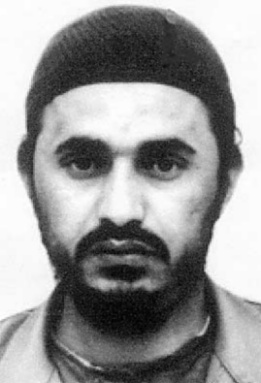Related Research Articles
Nazih Abdul-Hamed Nabih al-Ruqai'i, known by the alias Abu Anas al-Libi, was a Libyan under indictment in the United States for his part in the 1998 United States embassy bombings. He worked as a computer specialist for al-Qaeda. He was an ethnic Libyan, born in Tripoli.

Jama'at al-Tawhid wal-Jihad, abbreviated as JTJ or Jama'at, was a Salafi jihadist militant group. It was founded in Jordan in 1999, and was led by Jordanian national Abu Musab al-Zarqawi for the entirety of its existence. During the Iraqi insurgency (2003–11), the group became a decentralized network with foreign fighters with a considerable Iraqi membership.

Omar al-Faruq, also spelled or al-Farouq or al-Farooq, born Mahmoud Ahmad Mohammed Ahmad, was an Islamic militant with high-profile connections with Al-Qaeda and Jemaah Islamiyah in Southeast Asia particularly the Philippines and Indonesia.

Nashwan Abdulrazaq Abdulbaqi al-Tamir, better known as Abd al-Hadi al-Iraqi is an Iraqi member of Al-Qaeda who is now in United States custody at Guantanamo Bay detention camp in Cuba.

Abu Ayyub al-Masri, also known as Abu Hamza al-Muhajir, born Abdel Moneim Ezz El-Din Ali Al-Badawi, was the leader of Al-Qaeda in Iraq during the Iraqi insurgency, following the death of Abu Musab al-Zarqawi in June 2006. He was war minister of the Islamic State of Iraq from 2006 to 2010 and prime minister of the Islamic State of Iraq from 2009 to 2010. He was killed during a raid on his safehouse on 18 April 2010.

Abu Omar al-Baghdadi, born Hamid Dawud Mohamed Khalil al-Zawi was the Emir of the Islamic militant umbrella organization Mujahideen Shura Council (MSC), and its successor, the Islamic State of Iraq (ISI), which fought against the forces of the U.S.-led Coalition forces during the Iraqi insurgency.
During the 2001 Invasion of Afghanistan, many Taliban, al-Qaeda and militant fighters were captured and held at military bases in the region. On several occasions, there were instances of mass escapes.
Ismail Hafidh al-Lami — known as Abu Deraa is an Iraqi Shia militant whose men have been accused of retaliatory terrorizing and killing Sunnis.

Abu Musab al-Zarqawi, born Ahmad Fadeel al-Nazal al-Khalayleh, was a Jordanian jihadist who ran a terrorist training camp in Afghanistan. He became known after going to Iraq and being responsible for a series of bombings, beheadings, and attacks during the Iraq War, reportedly "turning an insurgency against US troops" in Iraq "into a Shia–Sunni civil war". He was sometimes known by his supporters as the "Sheikh of the slaughterers".

The Sons of Iraq or al-Sahwah were a coalition in the Al Anbar province in Iraq between Sunni tribal leaders as well as former Ba'athist Iraqi military officers that united in 2005 to maintain stability in their communities. A moderate group, they were initially sponsored by General Petraeus and the US military.
Hassan Ghul, born Mustafa Hajji Muhammad Khan, was a Saudi-born Pakistani member of al-Qaeda who revealed the kunya of Osama bin Laden's messenger, which eventually led to Operation Neptune Spear and the death of Osama Bin Laden. Ghul was an ethnic Pashtun whose family was from Waziristan. He was designated by the Al-Qaida and Taliban Sanctions Committee of the Security Council in 2012.

Operation Alljah was an operation launched by Coalition forces in Iraq, mainly U.S. Marines, in June 2007 to secure the neighborhoods of Fallujah. The strategy of the operation was somewhat based on a successful operation in Ramadi conducted in 2006. Insurgents in the town of Karma nearby were also targeted during the operation, which was part of the overall operation Phantom Thunder.

Tanzim Qaidat al-Jihad fi Bilad al-Rafidayn, more commonly known as Al-Qaeda in Iraq, was a Salafi jihadist organization affiliated with Al-Qaeda. It was founded on 17 October 2004, and was led by Abu Musab al-Zarqawi and Abu Ayyub al-Masri until its disbandment on 15 October 2006.

Operation al-Shabah was launched in May 2013 by the Iraqi Army, with the stated aim of severing contact between the Islamic State of Iraq and the Levant and the al-Nusra Front in Syria by clearing militants from the border area with Syria and Jordan.

The Islamic State of Iraq, was a Salafi jihadist militant organization that fought the forces of the U.S.-led coalition during the Iraqi insurgency. The organization aimed to overthrow the Iraqi federal government and establish an Islamic state in Iraq.

The Islamic State – Algeria Province is a branch of the militant Islamist group Islamic State (IS), active in Algeria. The group was formerly known as Jund al-Khilafah fi Ard al-Jazair.
2013 was the year in which the jihadist group Islamic State of Iraq and the Levant adopted that name. The group expanded its territorial control in Syria and began to do so in Iraq also, and committed acts of terrorism in both countries and in Turkey.
Abu Khalid al-Suri, also known as Mohamed al-Bahaiya or Abu Umayr al-Shami, was a Syrian Islamist insurgent who was often affiliated with the Muslim Brotherhood, Osama Bin Laden and the Syrian Islamist group Ahrar al-Sham. Al-Suri is also said to be a veteran, having participated in fighting in Afghanistan, Bosnia and Herzegovina, and Iraq. He was believed to be assassinated by an ISIL suicide attack in 2014, however ISIL denied involvement in the attack or regarded it as friendly fire.
The origins of the Islamic State group can be traced back to three main organizations. Earliest of these was the "Jamāʻat al-Tawḥīd wa-al-Jihād" organization, founded by the Jihadist leader Abu Mus'ab al-Zarqawi in Jordan in 1999. The other two predecessor organizations emerged during the Iraqi insurgency against the U.S. occupation forces. These included the "Jaish al-Ta'ifa al-Mansurah" group founded by Abu Omar al-Baghdadi in 2004 and the "Jaysh Ahl al-Sunnah wa’l-Jama’ah" group founded by Abu Bakr al-Baghdadi and his associates in the same year.
References
- ↑ "Al-Qaida affiliate in Iraq denies in Web posting that U.S. troops captured its top Iraqi". International Herald Tribune. July 24, 2007. Retrieved 2016-03-26.